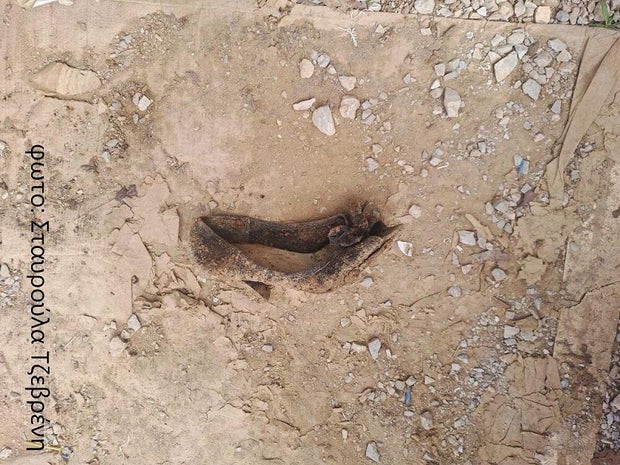Another series of unmarked graves — this one containing 14 individuals from Greece’s civil war era — have been dug up in a park in a suburb near the northern Greek city of Thessaloniki, local officials said Saturday.
As in the previous tight cluster of unmarked burial pits excavated earlier this year in Neapolis-Sykies, the bodies belong to prisoners who were held in a nearby Byzantine fortress. The prisoners, alleged communists and sympathizers, were executed between 1946 and 1953, according to historians.
The Yedi Kule castle, also known by its Greek name Eptapyrgio (“Seven Towers”) was a prison where communist sympathizers were tortured and executed during Greece’s 1946-49 Civil War and immediately afterward.
The new burial pits were uncovered on the site of a municipal park undergoing renovation, including the installation of new benches. The graves were not far beneath the surface, Haris Charismiadis, the supervising engineer of the park project, told The Associated Press.
Giannis Papanikos / AP
The renovation project is not currently a priority for local mayor Simos Daniilidis. “We insisted on continuing the digging for the graves,” he said. Charismiadis, who said most of the current batch of bodies were found during the past week, is certain there are more people buried nearby, including, probably, under the tarmac of streets adjacent to the park. An archaeologist is assisting in the digging.
In contrast with the 33 bodies found earlier this year, which were lying side by side, the recently found bodies are jumbled, as if thrown randomly, and hastily, in a heap. Torsos and heads are separated.
Previously, Charismiadis said teams had uncovered execution victims with “many bullets in the heads, the skulls.” Items found with the bodies — a woman’s shoe, a handbag, a ring — offer glimpses into the lives cut short.
When Yedi Kule prisoners were executed, their families were often not notified and they didn’t get to retrieve their bodies. Some found out about the fate of their loved ones from newspapers — one family happened upon the news while on the bus they had taken to the prison to bring their relative a fresh change of clothes.
Sykies municipality
Relatives of the executed have clamored for DNA tests to be done to ascertain the identity of the found bodies. Testing has not begun yet.
Tens of thousands died in the early Cold War-era battles between Western-backed government forces and left-wing insurgents, a brutal conflict with assassination squads, child abductions and mass displacements. CBS News journalist George Polk, who had depicted the right-wing Greek government as corrupt, was among those killed during the war.
In a statement earlier this year, the city said efforts to find other mass graves would continue “so that all the skeletons of the people who lost their lives in this way during the dark years of the Civil War and were not given the honors traditionally attributed to the dead are found.”

